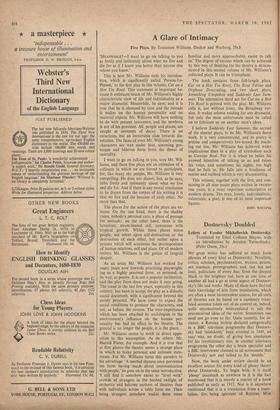A Glare of Intimacy
Five Plays. By Tennessee Williams. (Seeker and Warburg, 35s.)
'MEANWHILE! —I want to go on talking to you as freely and intimately about what we live and die for as if I knew you better than anyone else whom you know.'
This is how Mr. Williams ends his introduc- tion, which is significantly called 'Person-To- Person,' to the first play in this volume, Cat on a Hot Tin Roof. This statement is important be- cause it embraces much of Mr. Williams's highly characteristic view of life and individuality as a major dramatist. Meanwhile, he says; and it is true that he is obsessed by time and the inroads it makes on the human personality and on material objects. Mr. Williams will have nothing to do with present innocence, and the newborn is out of his province. All, people and places, are caught at moments of decay. There is no cataclysm, but an inexorable slide towards dis- solution. The faces of even Mr. Williams's young characters are wax under heat, assuming gro- tesque and hideous form from the threat of mortality.
I want to go on talking to you, says Mr. Wil- liams, and these five plays are an extension of a colloquy in which we are forced to participate, for, like many shy people, Mr. Williams is very compelling. He does not dissert, but, as he says, talks freely and intimately about what we live and die for. And if there is any moral conclusion to be drawn from the corpus of his writing it is that we live and die because of each other. No more than that.
The places for the action of the plays are ex- treme. On the one hand, there is the shabby room, nobody's personal care, a place of passage for nomads: on the other hand, there is the luxurious, steam-heated cell, cancerous with tropical growth. Within these places move people, not intent upon self-destruction or the destruction of each other, but rather upon a process which will accelerate the decomposition of human relations, self and place. Of all modern writers Mr. Williams is the genius of languid despair.
As an artist Mr. Williams has worked for many years now towards practising playwright- ing as a highly personal form, as personal, in its way, as poetry. It is not a popular inclination, and the play form does not make it easy going. The trend in the last few years, especially in this country, has been to accept the play as a didactic social document, with a significance beyond the purely personal. We have come to expect the social conditions to produce the characters, and not, as before, the reverse. The over-importance which has been attached by sociologists to the environment's influence on the human per- sonality has had its effect in the theatre. The ground is no longer the people, it is the place.
Mr. Williams seems to work in direct oppo- sition to this assumption. As do others. Mr. Harold Pinter, for example. And it is true that at first glance the theatre seems a strange place in which to make personal and intimate state- ments. Yet Mr. Williams turns this paradox to his advantage. 'A morbid shyness once prevented me from having much direct communication with people,' he goes on in the same introduction. 'I still find it somehow easier to "level with" crowds of strangers in the hushed twilight of orchestra and balcony sections of theatres than with individuals across a table from me. Their being strangers somehow makes them more familiar and more approachable, easier to talk to.' The degree of success which can be achieved by this way of thinking for the theatre is demon- strated in this second volume of Mr. Williams's collected plays. It can be triumphant.
The book contains three full-length plays, Cat on a Hot Tin Roof, The Rose Tattoo and Orpheus Descending, and two short plays, Something Unspoken and Suddenly Last Sum- mer. The alternative third act for Cat on a Hot Tin Roof is printed with the play. Mr. Williams calls it, not without irony, the Broadway ver- sion. It makes solemn reading for any dramatist, but only the most unfortunate must be called on to fabricate so on another man's ideas.
I believe Suddenly Last Summer, the second of the shorter plays, to be Mr. Williams's finest work. It is very concentrated, and its poetry is precise and comparatively low-keyed. By reach- ing out less, Mr. Williams has achieved wider implications than in a play of symbolism such as Camino Real. For it is when he belies his avowed intention of talking to us and raises his voice, and sometimes his sights, too high that he fails us. He falls into a brashness of matter and method which, is very disconcerting.
This volume, together with the first, and con- taining in all nine major plays written in twenty- one years, is a most important subscription to modern drama. The man, lonely, individualistic, vulnerable, a poet, is one of its most important figures.
JOHN WHITING














































 Previous page
Previous page